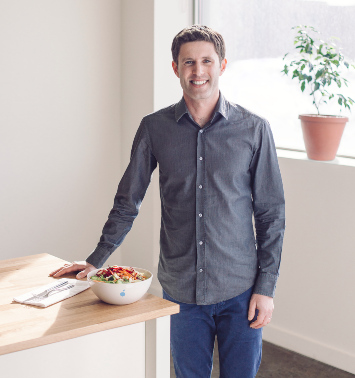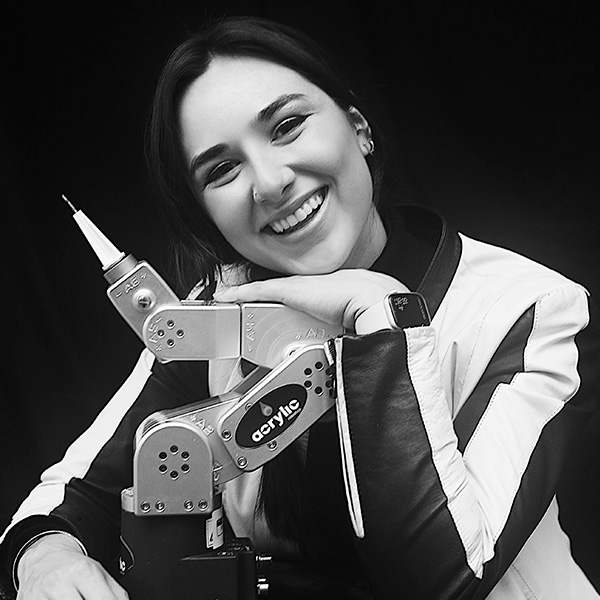It’s a typical February afternoon in Ottawa — cold, grey, lightly snowing — but David Segal, BCom’04, is all warmed up. He has just finished sampling a tasting menu for his young restaurant chain Mad Radish, a salad-focused kind of cuisine with a couple of other healthful non-salad offerings. Today, a salad with Asian-inspired flavours has captured his taste buds.
The recipe is not yet finalized, so Segal is reluctant to give away too much about it just yet, but suffice it to say: this is no ordinary salad.
A few years ago, the entrepreneur better known as the namesake for his first company, DavidsTea, returned to his hometown in the nation’s capital after many years spent in Montreal. With three young kids and most of his family in Ottawa, it felt like the right thing to do. It’s where, in 2016, he came up with the idea for his next big project.

Segal (left) likes to say that diet is the biggest health issue of our time. He looked around and saw a rotating cast of fast-food characters hawking burgers, fries, pizza. What he didn’t see was an accessible, consumer-friendly, healthy option.
“Salad has been everybody’s side dish for so long, and really what we’re trying to do is get people [to eat] a little more vegetables and give them full meals,” he says.
The first Mad Radish opened in downtown Ottawa in 2017. The company, co-founded by fellow DavidsTea expat Stephanie Howarth, now serves customers in seven locations in Ottawa and Toronto, and has 75 employees, with plans for gradual expansion in existing — and eventually, new — markets.
How Mad Radish is different from other salad options is that it mixes warm and cold ingredients, bold flavours and international flair. Its bibimbowl, a play on the Korean dish “bibimbap,” features cilantro-lime tofu, smoked mushrooms, sweet soy marinated cucumbers, a carrot ginger dressing and a spicy chili-based sauce.
Its fajita barbacoa bowl, meanwhile, boasts slow-cooked Mexican-style beef, chayote squash, vegetables, grated cheddar and fried plantain, finished off with sauces infused with jalapeno, cilantro, avocado and tomatillo.
“This is about how to get people food that’s healthy but also tastes good and is cravable. Fundamentally, we want to change people’s eating habits,” says Segal. “That’s why I’m doing this. I think it’s exciting to wake up every morning and try to inspire people to consume more consciously.”
This focus on conscious consumerism began early, during his university days.
Although Segal, who is now 38, was accepted to a number of fine universities back in 2000, he says his choice was obvious from the start. “My parents both went to McGill,” he says. “For me, it was always about Montreal.”
The two-hour-and-change commute took him a world away from his comparatively sleepy hometown. To an 18-year-old Segal, Montreal was definitely a cool city. He used the time to delve into issues close to his heart, like environmental sustainability, in between studying financial accounting and English literature. “I even wrote for the McGill Daily, once upon a time,” he says.
After graduating from McGill, he began working with his older cousin, Herschel Segal, BA’55 —founder of the Le Château clothing stores — to develop business ideas. The young graduate envisioned a new spin on loose leaf teas. The cousins launched DavidsTea in 2008 with a store in Toronto.
By the time it went public on the NASDAQ stock exchange in mid-2015, the company had 161 stores in Canada and the U.S.
A year after its IPO, the younger Segal resigned. He would, according to a press statement, be using his newfound free time to explore other entrepreneurial interests.
Retail is a particularly fickle beast. In an era where nearly everything can be ordered with a few taps and delivered straight to your door, the art and challenge of operating physical retail locations continues to morph every minute of every day.
For some, staying ahead of the curveball is a daunting exercise. For others, it is an exciting opportunity to reinvent an industry. Segal feels like he’s in the latter camp.
“It’s all about continuing to challenge yourself to elevate and get better, and really trying to crack the code on what customers want — and that’s a moving target. You never get to a place where you’re like, ‘Aha! I got it!’ Just when you think you have it is when you’ve got to change it. It’s an ongoing battle and you have to be ready for the long run,” says Segal.
As he has learned, accomplishing that takes a few key ingredients: a wide-open mind, a great team and a solid set of values.
With Mad Radish, Segal is able to make good on some of the values he formed back in his university days. For instance, he says, 100 per cent of the packaging the company uses is compostable: “We’re one of five per cent of companies in North America that do that.”
The company also donates a serving of fresh vegetables, via a partnership with Community Food Centres Canada, for every order placed on the Mad Radish app. “We’re up to 55,000 servings,” says Segal.
Segal believes that retail, in its position as a consumer-focused industry, can make and inspire real change in the world. “I like retail for that,” he says. “You’re really out there, in the public, trying to make an impact — and if you approach it the right way, it can be really exciting and meaningful.”


